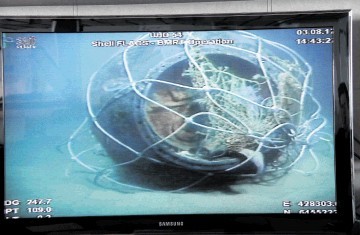
Unexploded wartime bombs found near defunct North sea oil and gas infrastructure pose no threat, the operator said yesterday.
A total of eight “unexploded ordnances” (UXOs) were discovered close to a pipeline and other parts of the export route for the Atlantic and Cromarty gas and condensate fields.
The two fields, eight miles apart and about 50 miles north-east of the St Fergus terminal near Peterhead, have been shut since 2010.
According to the Kingfisher Information Services (KIS), which is part of seafood industry body Seafish and has supplied vital information about subsea structures and the seabed for more than 50 years, six UXOs were discovered by remotely operated vehicles near the Atlantic-St Fergus pipeline.
Another two of the hazards were observed near Cromarty Well 1.
Both sections of the UK North Sea infrastructure network are part of a BG Group decommissioning project.
A spokesman for BG said the UXOs were “not in proximity to any works regarding debris clearance or other activity” and did not, therefore, feature in the decommissioning programme.
He added: “We were more interested to see whether the ordnance positions had moved in case there was any potential for interaction with the now disused pipeline. There are no plans for intervention.”
KIS said they were likely to be WW2 bombs, adding these were “fairly common” in the North Sea.
“Operators are well-appraised of the process of moving or dealing with them to remove risk to structures/environment,” it said.
A number of unexploded bombs have been caught in the nets of Scottish fishing boats over the years, while in 2012 oil giant Shell successfully removed a World War II mine which had threatened a major North Sea gas pipeline.
The unexploded device in the Shell incident was discovered years earlier on the seabed 62 miles off the coast of St Fergus.
Royal Navy experts initially advised Shell to leave it there but the firm later joined forces with specialised bomb disposal contractor Ramora UK to develop new equipment to remove it.
Nearly 20 years on, the UK-made UXO was finally lifted from the seabed and disposed off during a controlled explosion.
Recommended for you
